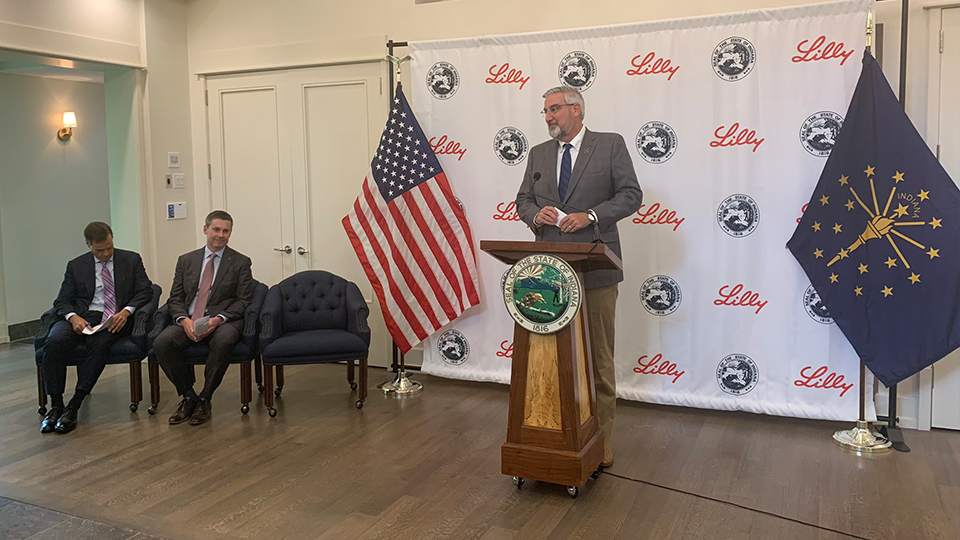State of Indiana snatching up property; some Boone County residents push back
Subscriber Benefit
As a subscriber you can listen to articles at work, in the car, or while you work out. Subscribe Now
The Indiana Economic Development Corp. continues to purchase property in Boone County as part of a $164 million investment approved last week by the State Budget Committee.
But not every landowner in Boone County seems interested in the state’s offer to buy. Near Lebanon, the proposed innovation district sits just off of I-65 between Indianapolis and Purdue University – ideal for the state’s plan for a large-scale technology park.
Jim Love has a 200-acre farm near the I-65 and Highway 52 interchange, a prime location for potential development. He plans to stay right where he lives – in the house he shared with his wife before she died two years ago.
“This is the only home I’ve ever lived in,” Love said. “My sons live on either side of me – one a quarter mile in each direction. They have no interest in moving either.”
Love said the state’s offers were “substantial,” and not below market price but said he didn’t need any money.
“With 200 acres, it’s not an income maker and it’s more like a demanding hobby,” he said. “But it’s a wonderful hobby… we’ve always said the best things we’ve grown here are our children.”
State plans for the site anchored by Eli Lilly
IEDC asked the State Budget Committee in late June for $164 million to purchase approximately 1,400 acres of land, of which 600 acres would be sold to Eli Lilly, one of the state’s largest employers.
David Rosenberg, the IEDC’s executive vice president, said Eli Lilly’s $2.1 billion investment in the site would be the company’s first investment in Indiana since 1989.
“Obviously they are key to our economy and the vital life sciences economy that we have,” Rosenberg said. “They’re also more of the industries of the future that we’re trying to attract and retain knowing that these companies will help build Indiana’s economy over the next several decades.”
Rosenberg told the budget committee that negotiations for the sale price of the 600 acres to Eli Lilly were ongoing.
Mark Wasky, the senior vice president for community affairs at IEDC, said the state, rather than Lebanon or Boone County, took over responsibility and funding for the project because of its scale.
Buying land as the state to sell to companies, rather than letting companies purchase directly, ensured the project could be completed by a certain timeframe.
“Pulling together land of this size is a pretty complicated process and takes time,” Wasky said. “We have the necessary infrastructure in place that we can show (the complete package) to a company rather than wait for them to be able to acquire it.”
The land, mostly north and west of Lebanon, will be annexed into the city and zoned over the summer.
Wasky said IEDC was working closely with the community to resolve any concerns about potential development.
“Overall, as we’ve spoken with landowners in the community, the reaction has been generally quite positive,” Wasky said. The IEDC, he noted, doesn’t have eminent domain authority and cannot force landowners to sell.
“Any land that we are acquiring for this project has been a number of purchase agreements from willing sellers that weren’t coerced in any way,” Wasky said.
Knowing that many landowners didn’t initially intend to sell their property, Wasky said IEDC worked with a professional brokerage firm and outside counsel to identify an appropriate asking price based on the appraised value of the land. Costs could range from $50,000 to $91,000 per acre, he said.
Wasky said portions of the remaining 800 acres would be given to the Indiana Department of Transportation for an interchange expansion along I-65, infrastructure improvements to water, wastewater and roadways to accommodate increased traffic and anything left could be sold to other companies.
Stakeholders are still working on whether the money Eli Lilly spends on the 600 acres returns to IEDC or the state’s general fund, Wasky said.
The state legislature in March approved a bill that would expand the IEDC’s incentive options, allowing the quasi-public state agency to operate without a formal agreement with local officials so long as investments in the district were below $2 billion, according to the Indianapolis Business Journal. Under this bill, local entities could receive as little as 12% of the taxes in the district.
The remaining 88% of taxes could be in a local fund controlled by the state with oversight from local governing bodies.
Back at the farm
Love said he’s sure the state could offer a level of money that would be “crazy” to refuse but doesn’t see himself changing his mind anytime soon. He enjoys looking out over his fields of corn and soybeans and doesn’t want the view disrupted by warehouses or manufacturing sites.
“I’m 76 years old. I’d like to spend my time – however much there is – right here,” Love said.
Being so close to his sons means his grandchildren and great-grandchildren visit often and his grandson now oversees the farm instead of the older generations.
“When I see (my grandson) out there, I remember how it felt when I was doing it,” Love said. “It makes me proud of the fact that he’s doing it because he loves it too.”
The Indiana Capital Chronicle is an independent, not-for-profit news organization that covers state government, policy and elections.
